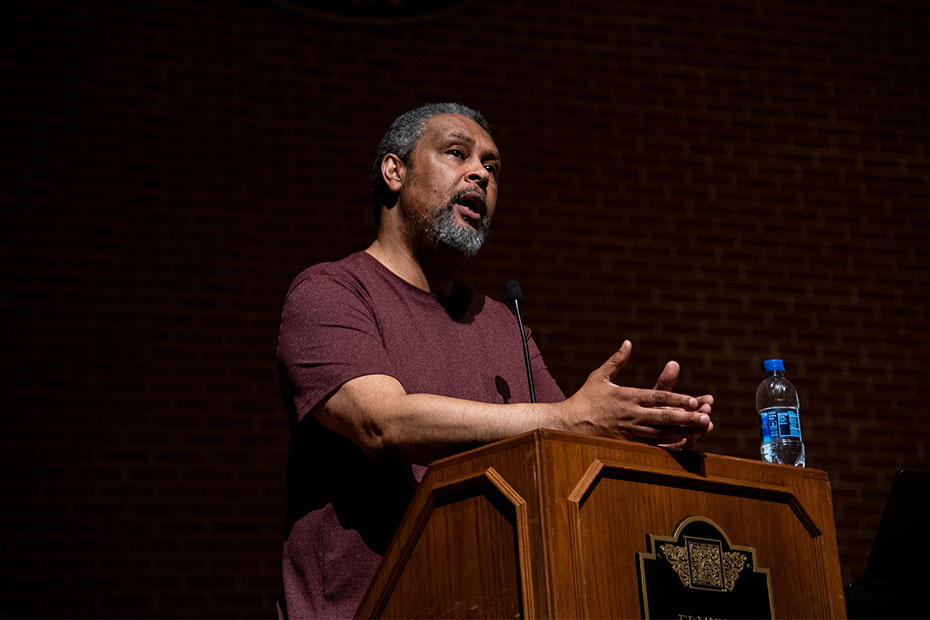Oscar-winning screenwriter talks diversity at PC

With the success of “BlacKkKlansman,” screenwriter Kevin Willmott says he has had the opportunity to talk about race and the resurgence of hate in the country.
“That is clearly a dangerous thing and a real topical thing, that I feel we’re going to look back on this period and we’re going to have to really access ourselves and regroup,” said Willmott, who recently spoke at PC.
The Oscar-winning filmmaker, who is also a professor in the Film and Media Studies Department at the University of Kansas, provided a public lecture, “Race, Film and the Resurgence of Hate,” on Thursday, April 25 in Edmunds Hall.
“For me, much of what I understand about these issues comes from where I grew up,” Willmott said.
‘We really had diversity’
Willmott grew up in small-town Junction City, Kansas, adjacent to Fort Riley in the late 1960s and 70s. He said what he remembered from that time were the Buffalo Soldiers in his community — black soldiers from the 9th and 10th Cavalry Regiments who had served all over the world.
Willmott said he admired the soldiers and went on to talk about how the interracial neighborhood – a result of the soldiers’ families – shaped him.
“We really had diversity, but it wasn’t celebrated,” Willmott said. “In fact, the beautiful diversity we had in our neighborhood, the city kind of felt embarrassed about, and Junction City always had a negative reputation, I think, primarily because it was so interracial.
“… But the beautiful thing about it was, us kids, we just hung out,” he continued, “and we knew that there was nothing that separated us and we all had to find a way to really embrace who we were and to really take pride in who we were and the kids in the neighborhood — we gave each other that.
“We may not have been getting that from the city, we may not have even been getting it from the school, but the neighborhood, we gave each other that, and it was a beautiful thing.”
The theme of identity is in many of the stories he tells and films he makes, he said. “BlacKkKlansman” is no exception. The film, based on the 2014 memoir by Ron Stallworth, follows an African American detective who infiltrates the Ku Klux Klan alongside his Jewish colleague.
Critical acclaim for ‘BlacKkKlansman’
The film has won a BAFTA; the Grand Prix at the Cannes Film Festival; garnered four Golden Globe nominations and six Academy Award nominations; and won the Academy Award for Best Adapted Screenplay. Willmott co-wrote the screenplay with Charlie Wachtel, David Rabinowitz and director Spike Lee.
“When ‘BlacKkKlansman’ came along, Spike and I, we talked about how can we kind of take this, this reality that we’re living in, this current situation – political, social, historical – how can we take that and put it into a film?” Willmott said. “And Spike said from the very beginning that he wanted a film to speak to today so we were trying to find things from the past that really connected to today.”
Willmott, who also spoke with students and faculty members earlier in the day, talked about hate groups’ past and present recruitment efforts and the recent violence in Charlottesville, Virginia.
Making Movies and ‘Twoness’
The screenwriter explained the messages he and Lee wanted audiences to take away from the film, as well as the movie-making process.
“We were trying to strike the balance of letting the humor be funny and letting the serious stuff be serious, and I think we kind of found that balance,” Willmott said.
“You know, one of the tricky things about these movies is the whole thing of: How do you approach the super negative stuff? The thing that Spike and I believe is: You don’t apologize for hate; you don’t try to make it acceptable. You don’t try to tone it down a little bit. You don’t water it down, make it palatable.
“You just lay it out there, and when you lay it out there for everything that it is, that’s actually where the humor is because you show hate for how absurd it is and the absurdity is where the humor is. We didn’t have to tell jokes. We didn’t try to make it funny. We just tried to show you how crazy and insane that attitude is.”
The screenwriter also argued that to be American, we must have uncomfortable discussions.
“Twoness,” a philosophical approach by W.E.B. DuBois, was the controlling idea of the film, Willmott added.
“He (DuBois) said that African Americans are American and then they are black, and so sometimes these two factions are warring against each other,” Willmott said. “… I tried to find every form of twoness I could so that was the controlling idea. Movies typically kind of want to go out. They want to expand and go bigger, and your job is really to make them go in and make them about one thing.”
Diversity at PC
Willmott’s talk rounded out the annual Honors Day events Thursday. It was the final installment in a lecture series hosted by the Office of Diversity and Inclusion this academic year.
Earlier events included a Black History Month lecture, as well as a Dr. Martin Luther King convocation. To learn more about Diversity and Inclusion at PC, please visit Diversity at PC.
